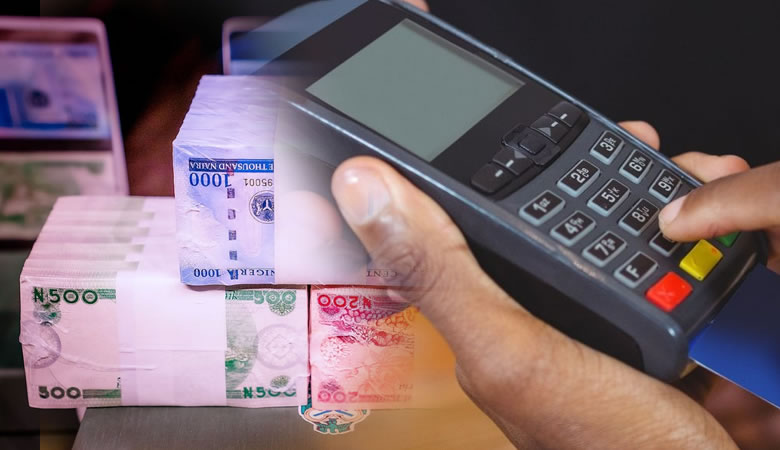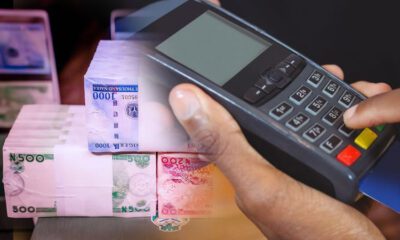Money market
POS transactions crash by N226bn in Q1, 2024

Point-of-Sale (POS) transaction values witnessed a downturn in Nigeria for the first quarter of 2024, registering a N225.73 billion drop when compared to the corresponding quarter of the previous year.
This significant decline marks a 7.94 percent fall in the use of POS systems for transactions within the country as the currency outside banks surged.
The contrasting trends of POS transaction values and volumes—sourced from the Nigeria Inter-Bank Settlement System (NIBSS) with the data of the Central Bank of Nigeria (CBN) on currency circulation offer a complex picture of the financial habits of Nigerians in the first quarter of 2024.
While this analysis encompasses the first quarter of 2024, the CBN has not yet released the data for March 2024. This limits the analysis for cash outside banks to February 2024.
The quarter opened with a slight uptick in POS transaction values, which stood at N850.09 billion in January 2024, surpassing January 2023’s figures.
However, the initial growth was short-lived, as February 2024 saw a reduction in transaction values to N805.05 billion, down from N883.45 billion in February of the previous year. The downward trajectory extended to March 2024, where the value of transactions through POS systems further decreased to N961.86 billion from March 2023’s high of N1.15 trillion.
The total value of transactions for Q1 2024 summed up to N2.62 trillion, failing to match the N2.84 trillion recorded in the same period in 2023.
The decline in Nigeria’s POS transaction values for Q1 2024 is further mirrored by a similar fall in transaction volumes. Alongside the N225.73 billion drop in transaction value, the number of POS transactions also reduced considerably.
January 2024 saw an initial rise in transaction volumes to 112.78 million, an increase from 96.35 million in January 2023. Despite this initial rise, the overall trend for the quarter was a decline.
In February 2024, the volume of POS transactions decreased to 97.57 million from the 113.53 million recorded in the same month of the previous year. March continued this decline, with volumes falling to 103.65 million, down from the high of 177.93 million seen in March 2023.
When totaled, the first quarter of 2024 saw POS transaction volumes reach 314 million, which is a significant drop of 73.81 million, or 19.03 percent, from the 387.81 million transactions recorded in the first quarter of 2023.
This decline in POS transaction values and volumes can be seen in the context of the cash scarcity that hit Nigeria in the first quarter of 2023.
The cash shortage during that period led to a surge in cashless transactions, including the use of POS systems, as citizens sought alternatives to conduct their daily business in the absence of sufficient cash circulation.
The recent decline in POS usage suggests a reversal of the cashless trend, possibly indicating that the aftereffects of the previous year’s cash scarcity might be normalising, or that new patterns in consumer transaction behavior are emerging.
Despite the downturn in POS transaction values and volumes in Nigeria for Q1 2024, there has been an uptrend in the registration of POS terminals during the same period.
In Q1 2023, the number of registered POS terminals increased by 218,475, from 2,318,947 in January 2023 to 2,537,422 by March 2023. By the same quarter in 2024, the number of registered POS terminals had increased by 289, 154, from 3,441,287 in January 2024 to 3,730,441 by March 2024.
Overall, between the end of Q1 2023 and that of Q1 2024, Nigeria has witnessed an additional 1,193,019 POS terminals, marking a 47.02 percent increase.
This rise in terminal registration seems counterintuitive given the simultaneous decrease in transaction value and volume. It could suggest that while the immediate usage of POS systems has dropped, the infrastructure continues to expand.
Amid the decline in POS transaction values and volumes, alongside the significant rise in registered POS terminals in Nigeria for Q1 2024, the scenario is further compounded by the increasing trend of cash outside the banking system.
The CBN data show a notable preference among Nigerians to keep cash at home. In January 2024, cash outside banks escalated to N3.28 trillion, which is an increase of 314 percent from N792.18 billion in the same month of 2023. For February, the amount skyrocketed further to N3.411 trillion, marking a 305 percent increase from the N843.31 billion recorded in February 2023.
Similarly, the amount of currency in general circulation followed this upward trajectory. The CBN reported that in January 2024, the currency in circulation rose by 163 percent to N3.65 trillion, from January 2023’s N1.39 trillion. In February 2024, the amount reached N3.69 trillion which represents a 276 percent increase from February 2023’s figure of N982.1 billion.
Approximately 92 percent of all currency in circulation in February 2024 was outside the banking system. This is a notable increase from February 2023, when the figure stood at 86 percent.
The growth in the proportion of currency held outside banks is significant and suggests a deepening trend of cash retention by Nigerians, a pattern that may have influenced the observed decrease in POS transaction activities despite the expanding availability of POS terminals.
Together, these figures from NIBSS and CBN suggest a period of adjustment and a possible recalibration of trust in cash-based transactions, likely still echoing the cash scarcity challenges of the previous year.
Money market
Lagos, India to boost trade partnership


The Lagos Chamber of Commerce and Industry and the Confederation of Indian Industry have signed an agreement to boost trade partnership.
In a memorandum of understanding in Lagos on Tuesday, both parties observed that the agreement would enhance avenues for effective collaborations.
Lagos Chamber of Commerce and Industry Deputy President Knut Ulvmoen said that the partnership’s focus was to leverage the trade capacity of both parties.
Ulvmoen said that both parties would explore capacity in Information and Communication Technology, medical, training, agriculture, manufacturing and export, among others.
He acknowledged what he described as robust and enduring trade relations between Nigeria and India.
He noted that over the years, both nations had witnessed a steady growth in bilateral trade with significant contributions from various sectors.
“Today’s meeting serves as a platform to, not only strengthen the existing partnerships, but also to forge new alliances that will contribute to the sustainable growth and development of both nations.
“Together, we must seize this moment to identify synergies, exchange expertise, and explore innovative solutions to economic challenges.
“Let us leverage the collective wisdom of our industries to develop actionable strategies that will drive inclusive growth, foster entrepreneurship, and enhance competitiveness,” he said.
Indian High Commissioner Shri Balasubramanian expressed his belief in shared growth and prosperity by both countries.
He also emphasised the importance of Nigerian-Indian business collaboration.
Balasubramanian stated that the government of India was making efforts to build capacity in trade, seeking private sectors’ partnership to identify projects that could be profitable to the trade structure of both countries.
“The opportunities existing between both countries are enormous as more than 155 Indian companies in Nigeria employ many Nigerians.
“From oil to steel; to healthcare, we are willing to link Nigerians up with their counterparts in India as we explore avenues of collaboration and partnership,” he said.
Money market
Naira remains at N1,350 as CBN targets FX inflow for liquidity boost


The naira on Tuesday steadied at 1,350 per US dollar on the parallel market, popularly called black market.
On Monday morning, the naira opened the foreign exchange (FX) market at the same rate before closing at N1,360/$1 on the same day at the black market.
At the official market known as the Nigerian Autonomous Foreign Exchange Market (NAFEM), the naira on Monday fell to 1,419.11 per dollar, the lowest since March 13, 2024 at the official FX market, following slowing inflows occasioned by the withdrawal of funds by Foreign Portfolio Investors (FPIs).
The intraday high closed at N1,451 per dollar on Monday, weaker than N1,410 closed on Friday. The intraday low also depreciated marginally to N1,060 on Monday as against N1,051/$1 closed on Friday at NAFEM, data from the FMDQ Securities Exchange indicated.
Dollars supplied by willing buyers and willing sellers declined by 52.16 percent to $147.83 million on Monday from $309.01 million recorded on Friday.
On day to day trading, the naira weakened by 5.63 percent as the dollar was quoted at N1,419.11 on Monday as against N1,339.23 quoted on Friday at NAFEM.
During the recent Monetary Policy Committee (MPC) meeting, Governor of the Central Bank of Nigeria (CBN), Olayemi Cardoso, emphasised the critical need to attract inflows to maintain liquidity in the foreign exchange market and stabilize the exchange rate.
In his statement, Governor Cardoso highlighted the importance of addressing inflationary pressures through exchange rate management to safeguard both price stability and long-term economic growth.
“Failure to tame inflationary pressure using the exchange rate channel may jeopardise not only price stability but also long-term growth,” stated Governor Cardoso.
Addressing concerns raised at the March 2024 MPC meeting, Governor Cardoso emphasised the need to reduce negative real interest rates to attract capital flows and enhance liquidity in the FX market. He stressed the significance of attracting capital flows through foreign portfolio investments and moderating exchange rate pressures to mitigate the impact of exchange rate pass-through on inflation, particularly in Nigeria’s import-dependent economy.
Commenting on the monetary situation, Mustapha Akinkunmi highlighted a decline in Nigeria’s reserve money by 24.91 percent to approximately N22.2 trillion by the end of February 2024. Despite this, broad money (M3) supply increased to N93.7 trillion, contributing to inflationary pressures. Nigeria’s external reserves also decreased to US$32.87 billion as of March 19, 2024, from US$33.68 billion in February 2024.
Although current reserves cover imports for 5.7 months of goods only and 4.5 months of goods and services, the country’s ability to repay short-term debts using reserves exceeded the threshold at 104.0 percent, he said.
According to him, the reserves-to-broad money ratio of 33.1 percent surpassed the 20.0 percent threshold, indicating Nigeria’s capacity to manage capital flows effectively.
Governor Cardoso’s emphasis on attracting inflows and managing exchange rate pressures underscores the CBN’s commitment to maintaining stability in the FX market and combating inflationary challenges in Nigeria’s economy.
Money market
Mobile channel most vulnerable, as financial institutions lose N17.67bn to fraudsters in 2023


Latest report by the Nigeria Inter-Bank Settlement System (NIBSS) on Annual Fraud Landscape (January to December 2023) has revealed that commercial banks, Point of Sales (PoS) operators and others lost about N17.67 billion to fraudsters in 2023.
The report published on its website on Monday identified mobile channels as the most vulnerable avenue for fraudsters notably Web and POS businesses.
The report noted that fraud perpetrated via mobile channels increased by five percent compared to the previous year.
It also suggested some of the regulations inputted to check fraud in financial institutions need detailed examination, modification and reinforcement.
According to the statistics revealed by the report, fraud count dropped by six percent to 95,620, as actual loss from fraud grew by 23 percent in 2023 when compared to 2022 with the first quarter being the month with the highest fraud volume in 2023 and the fourth quarter being the month with the highest fraud value.
It also disclosed that the month of May recorded the highest fraud count of 11,716, followed by February with 9,492 while October saw the highest actual loss in 2023 at N3.7 billion, followed by January with N2.7 billion. It said the count of Web Fraud decreased by 38 percent and ATM fraud recorded a 64 percent reduction from 2022 to 2023.
Also, in 2023, people aged 40 and above remained the primary targets of fraudsters, which NIBSS said signified a persistent focus on the targeting strategy of fraudsters.
“This sustained trend emphasises the enduring appeal of the demographic group as potential victims, reinforcing the need for continuous efforts to educate and protect individuals in this category from fraudulent activities,” NIBSS said.
In 2023, a total of 80,658 unique customers fell for the gimmicks of fraudsters which is four per cent less than 84,130 customers recorded in the previous year.
“This decline, though apparent, does not diminish the severity of the issue, urging the financial industry to remain vigilant, enhance security measures and collaboratively address the tenacious challenges posed by fraud,” it said.
-
capital market2 years ago
Rt.briscoe, FBNH, Others halts negative performance of stock market
-
Finance3 months ago
Court orders Sen. Victor Umeh to repay N136m bank debt to AMCON
-



 Abuja Update2 months ago
Abuja Update2 months agoUNDP, FG partnership needed to achieve inclusion, equity- Minister
-
Abuja Update1 month ago
Banks drive stock market performance with N147bn gain
-



 Business2 weeks ago
Business2 weeks agoTingo Group unveils Tingo Electric, Tingo Cola drink at Lagos launch
-



 Health3 weeks ago
Health3 weeks agoCapacity training will reduce migration of health workers- NPHCDA
-
News4 months ago
Oil thieves sponsoring malicious media campaign against Navy – Spokesman
-



 Infotech1 month ago
Infotech1 month agoWorld Backup Day: NITDA urges Nigerians to ensure backup of data








